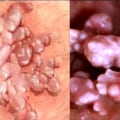Genital warts are a type of sexually transmitted infection (STI) caused by certain strains of human papillomavirus (HPV). They are similar to common warts, but are usually found around or in the vagina, the cervix (the lower part of the uterus), the penis, the scrotum, the rectum, or the area between the vagina and the rectum. Genital warts can be raised or flat, small or large, and sometimes they are grouped together in the shape of a cauliflower. Some warts may be so small and flat that they aren't immediately noticeable.
Having genital warts can cause feelings of anxiety, depression and a sense of diminished quality of life, especially at the time of first diagnosis. The HPV vaccine helps protect against the most common strains of HPV, including strains that cause genital warts or increase the risk of cervical cancer.
Diagnosing Genital Warts
The doctor will examine you or take a biopsy (a sample of the wart) to see if you have genital warts. About one-third of the HPV strains found in genital wart biopsies can also contain high-risk, cancer-causing strains of HPV.Even when there are no genital warts, HPV can be present on the skin and spread during sexual contact. Couples should be seen by a healthcare provider who can detect genital warts and test for other STDs.
Treating Genital Warts
Sometimes genital warts go away on their own when left untreated, while other times they stay the same or even increase in number and size. Two strains of HPV, in particular HPV 6 and HPV 11, are responsible for approximately 9 out of 10 cases of genital warts.Genital warts can also be present inside the body, such as in the vagina, the cervix, the inner part of the labia, and the inside of the anal canal. The virus will remain in the body, which means that you may experience outbreaks of genital warts in the future. If you have been diagnosed with genital warts, there are several treatment options available to you. Your doctor may recommend topical creams or ointments to help reduce symptoms and prevent further spread.
Other treatments include cryotherapy (freezing off warts with liquid nitrogen), laser therapy (burning off warts with a laser), or surgical removal.
Conclusion
Genital warts are a common type of sexually transmitted infection caused by certain strains of human papillomavirus (HPV). They can cause feelings of anxiety and depression and can have serious health implications if left untreated. If you have been diagnosed with genital warts, it is important to talk to your doctor about treatment options as soon as possible.The HPV vaccine is also available to help protect against certain strains of HPV that cause genital warts or increase the risk of cervical cancer.










